- NEW DVD Series – Stone Setting with Bezels
- Tube Set Charm by Kim St. Jean
- Prong Basket Pendant by Kim St. Jean
- NEW DVD Series – Stone Setting with Cold Connections
- New DVD Series – Stone Setting with Wire
- NEW DVD Series: Introduction to Stone Setting by Kim St. Jean
- Featured Tool: Bracelet Bending Plier
- NEW Dvd by Eva Sherman
- Fun, Fast Fold Forming DVD Series
- Double Band Ear Cuff from Alex Simkin
Daily Wire Tip Dec. 19: Which Wire Should I Use to Make My First Bracelet?
Daily Wire Jewelry Making Tip
December 19, 2009
Question:
I’m a little confused about the best gauge to use to make wire sculpted bracelets. Your CDs state 21-24 GA half round half-hard, other books say start with 16 GA half-round, or square half-hard wire. Which should I use as a beginning wire sculptor to make my first bracelet? And which is the best gauge wire to do the wraps? I tried to use silver 21 and 24 gauge, but they are too thin and soft.
Answer:
I would love to answer your question with total accuracy, but I need a bit more information from you please.
My questions to you are: Are you referring to Preston’s DVDs or mine (Dale/Cougar)? Are you wishing to ‘sculpt’ (swirly things) or use tradition wire wrapping techniques?
Right now, I can answer only according to my personal ‘traditional wire wrapping’ techniques. I do not believe in using any type of soft or dead soft wire to make bracelets unless you are sculpting, and then only in certain areas. (Bracelets are in a ‘high traffic’ area and need to be a strong piece of jewelry). My students, faculty members and I use half-hard square wire for 95% of our bracelet designs. (We are also known for taking the designs of other patterns and changing the designer’s chosen wire to reflect our preferences, with great results!)
Most bracelet patterns can be made using either 21 or 22 gauge, square half-hard wire, including the all-important, cannot slip or slide, wraps! For a more masculine bracelet 20 gauge is a heavy, strong choice. Most bracelet designs that call for using a half-round wire for the wraps can be altered to use a square half-hard.
Answer contributed by Dale “Cougar” Armstrong
Have a question? Submit your question here!





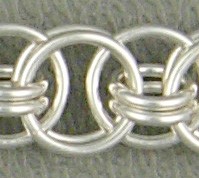
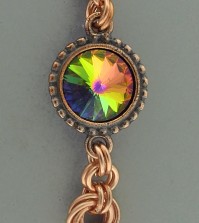
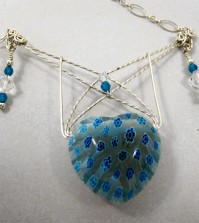
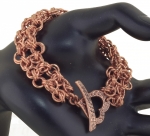

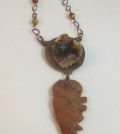
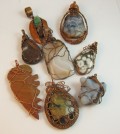

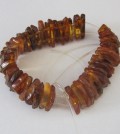

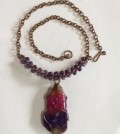
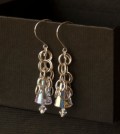
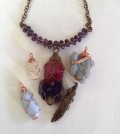
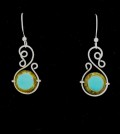
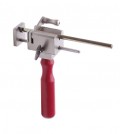
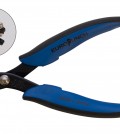
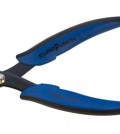
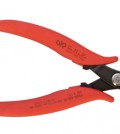
MaryJeanne
December 19, 2009 at 9:16 am
I have always found that a 24g wire is the best to use for wire wrapping and is especially nice to use when doing viking knit! Anything lower seems to be too stiff/hard to work with.
dalecgr
December 19, 2009 at 10:11 am
MaryJeanne is correct by referring to using a 24g wire for the Viking Knit (actually a ‘weaave’). This technique can also be made using a 26g wire, depending on what the knit is used for. For example, earrings or a double knit would do best using a 26g wire. However in my opinion, 24g is not strong enough for most ‘traditional’ wire jewelry bracelet designs.
Dale/Cgr
mary ellen miron
December 19, 2009 at 10:32 am
im pretty new at jewelry and wonder what is weave ??
dalecgr
December 20, 2009 at 12:20 pm
Mary Ellen,
A wire ‘weave’ is the same as weaving anything; such as braiding hair is a type of ‘weave’. In jewelry making this procedure is usually done with round wire. My friend Linda Chandler is known for her woven bracelets that have been created using weaves similar to those used in basket-making.
Dale
Betty Rader
December 19, 2009 at 11:07 am
What is viking knit?
dalecgr
December 20, 2009 at 12:10 pm
Betty,
The Viking ‘knit’ is actually a type of weaving that is done by using a wooden dowel and weaving round wire around it, and then pulling the woven wire cord through a series of wooden draw plates to make it longer and more condensed, or just leave the woven cord alone, for a lacey look. To find more about how to make the Viking Knit, do an internet search for ‘Viking Knit tutorial’, as I found several nice free versions and a couple of videos as well. Have fun!
Dale
Jayne
December 19, 2009 at 9:19 pm
My best advice is to consider the pattern being worked rather than assign a blanket standard to all pieces. With woven designs, there will be two separate wire guages used- which are normally best served if they are 10 sizes apart. (Example: If your design begins with 16 guage for the structure, the weaving would be done with 26 guage.) But, at any rate, I would select the guage of wire based on the pattern. Variations in guage, (even using the same pattern) will produce different, and sometimes fabulous results.
Jessie Adams
December 20, 2009 at 2:11 am
This is a vert subjective question and I agree with Dale that half hard wire is the best bet for making bracelets. However thinking back to the necklace I made for a customer years ago out of 8 guage silver round it would have been impossible to make with half hard and in that case I did use dead soft
Hope everyone has a wonderful Holiday Season.
Jessie